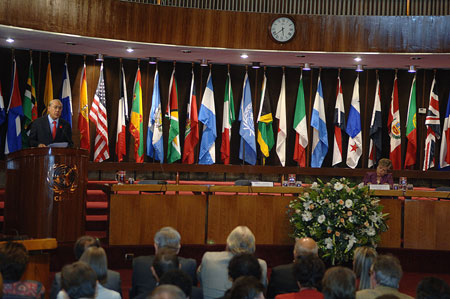Latin America Should Seek New Sources of Growth for a Sustainable Recovery
Work area(s)
Ángel Gurría spoke at ECLAC about Chile's accession to the Organization for Economic Cooperation and Development and exit strategies for the global crisis.

(11 January 2010) Latin America should move towards new sources of economic growth with greater value added for a sustainable recovery from the crisis, stated the Secretary-General of the Organization for Economic Cooperation and Development (OECD), Ángel Gurría.
Gurría delivered a lecture at ECLAC headquarters today on "Chile's accession to the OECD - Together for a cleaner, stronger and fairer world economy' after participating earlier in the day in the signing ceremony of the country's accession to the organization, held at Chile's presidential palace.
"If Latin America wants to be more competitive and productive, it clearly has to migrate towards manufacturing and services, taking advantage of its installed capacity, reserve of talent and the fact that we are no longer a region with low-cost labour," he said.
Although economic recovery has begun, growth over the next few years will be modest, fiscal balances will continue to be negative, and employment will improve only long after other economic indicators, added Gurría.
In her welcome words to Gurría, ECLAC Executive Secretary Alicia Bárcena noted how both organizations coincide in rethinking post-crisis development models.
"Our teams are working together, reflecting on vital issues such as climate change, innovation, green jobs, fiscal policies and corporate governance," she said.
Gurría added that with such high dependency on the export of prime materials in open markets over which countries in the region have no control, Latin America needs a model based on innovation to better face the challenges of productivity, competitiveness and long-term growth.
"The growth model for the following decades has to be intelligent... If recovery isn't quick, the progress made during the first half of this decade in terms of reducing inflation and creating employment may be lost, and that would be politically and socially very serious," he warned.
After the talk, Gurría visited the gardens of the ECLAC building with his wife, Lulú Quintana, daughter of Carlos Quintana, who was Executive Secretary of the Commission between 1967 and 1972.
It was Carlos Quintana's wife, Lulú de Quintana, who contributed to creating ECLAC's gardens, which complement the building designed by architect Emilio Duhart and that was recently granted the Government of Chile's Bicentennial Construction Award.
"This building would be nothing if Lulú de Quintana hadn't passed through here and left us with this wonderful trail, this garden that today adorns ECLAC," said Bárcena.
For more information, contact ECLAC's Information Services.Email: dpisantiago@cepal.org; telephones: (56-2) 210-2380/2149.
Country(ies)
- Latin America
- Chile
Contact
Public Information Unit
- prensa@cepal.org
- (56 2) 2210 2040